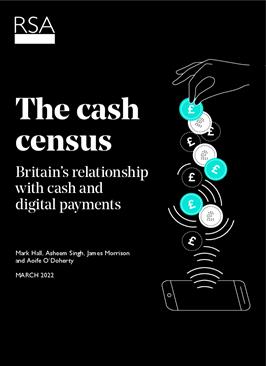The cash census is a new piece of RSA research exploring the use of cash in an increasingly digital economy.
This project aimed to understand the gap between those who reject cash and those who hold on to it; to understand in granular detail people’s attitudes and behaviours towards cash and digital payments and the impact of Covid-19 on this and our cash infrastructure. We hypothesised that this was not simply a case of ‘to cash and cash-not’, but that there were more complex emotional and societal dynamics in play.
An unmanaged transition towards a cashless society could have major consequences for many in society. The following five findings in the report support this:
- While more people are using online payments and banking, three years on from the Access to Cash Review in 2019, the section of society that would feel left behind in a cashless society, remains almost identical.
- Forcing people on to digital could lead to a loss of control over finances and spiralling debts.
- Rural communities and vulnerable citizens could become unable to access cash.
- A cashless society could lead to increased isolation and reduced human connection.
- A cashless society could lead to mistrust in the system due to concerns over fraud, cybercrime, and technology system failures.
In brief, we also found:
- One in five people (19 percent of the population, 10 million people) say they would struggle to cope in a cashless society.
- Fifteen million people (29 percent of the population) say they could cope but it would be a major inconvenience.
- Almost half the population (48 percent, 25 million people) say that it would be problematic for them if there was no cash in society as they know it.
- More than a quarter (29 percent, 15 million people) of the population use cash for budgeting.
- 8 million people (15 percent of the population) were using cash more because of the pandemic.
- Two-thirds of the population (64 percent) are concerned about fraud when making digital payments.
Our findings affirmed our hypothesis. UK consumers’ attitudes to cash are indeed highly variegated and offer many counter-intuitive propositions about the state of society and the future of economic policy. We present them in this report alongside two interactive data dashboards.
Read the report and explore the dashboards below.
pdf 2.6 MB
Related articles
-
A just transition: visions and takeaways of participatory futures in Scotland
Blog
Fabian Wallace-Stephens
A blog on the rural and post-industrial perspectives on the just transition in Scotland highlighting some of the key takeaways which, if implemented, will help achieve this vision.
-
Rural and post-industrial perspectives on the just transition
Report
Fabian Wallace-Stephens Emma Morgante Veronica Mrvcic
This report explores how changes to the energy system could impact specific Scottish regions and bring together citizens to collectively imagine better futures.
-
The RSA is pleased to announce the launch of its Financial Services Network
Fellowship news
Our new Financial Services Network is a Fellows-led initiative helping to drive a ‘Finance for Good’ agenda.







